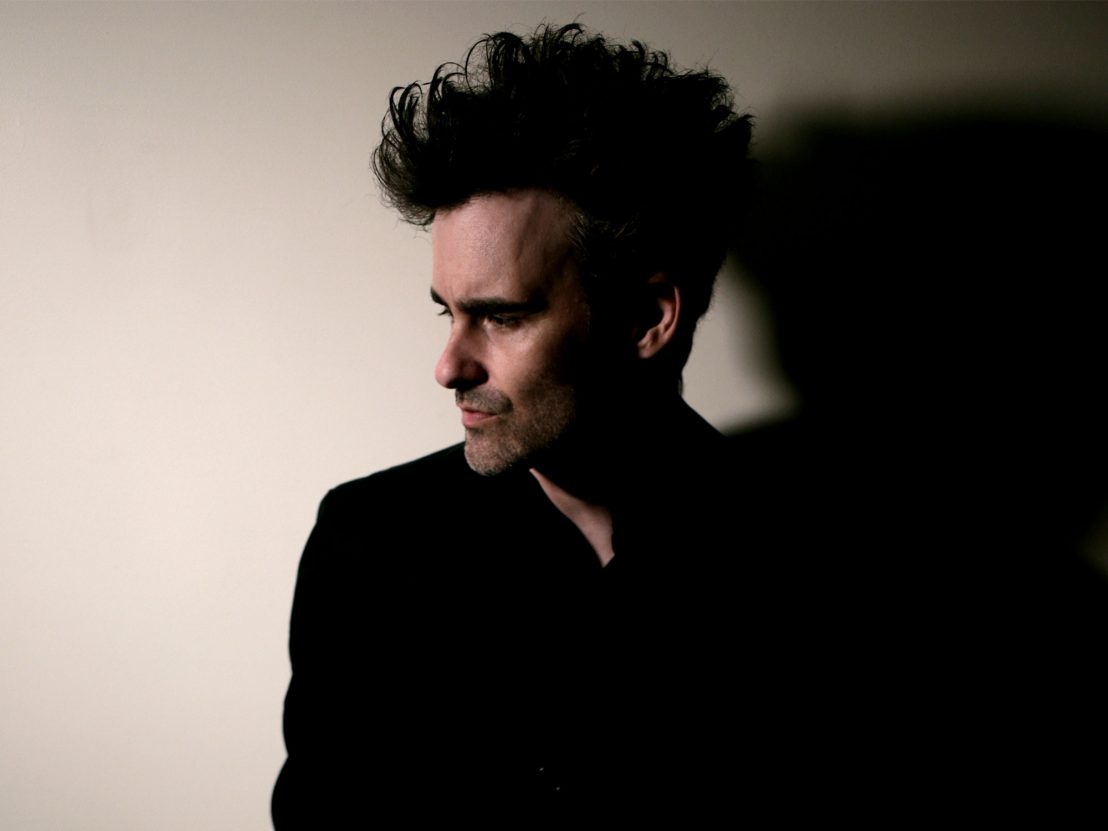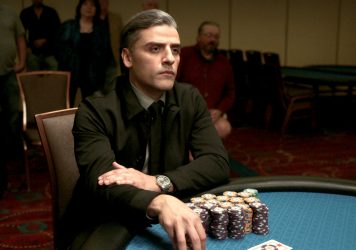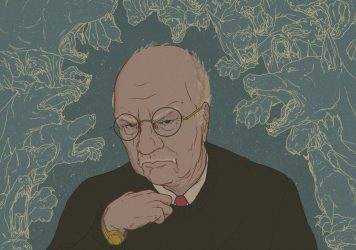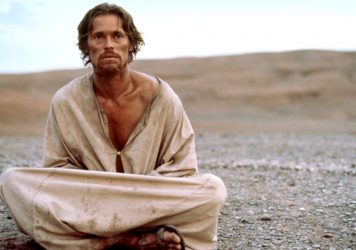
Black Rebel Motorcycle Club’s co-founder reflects on going head-to-head with director Paul Schrader.
Robert Levon Been met director Paul Schrader through his late father, Michael Been, co-founder and lead singer of American rock band The Call, who was cast in Martin Scorsese’s Schrader-scripted 1988 film, Last Temptation of Christ. A young Levon Been joined his father on location in Morocco during filming.
He would later work with Schrader himself when his father was approached to soundtrack 1992’s Light Sleeper after plans to work with Bob Dylan fell through. At just 16, Levon Been was given a chance to contribute to his father’s songs, gaining first-hand experience of Schrader’s meticulous ear for detail.
Fast-forward to 2020 and a chance call from Schrader led to the pair joining forces again. What initially started out as a one-song project evolved into multiple tracks, as well as contributions to The Card Counter’s instrumental score and sound design. The end result is two distinct albums: a standalone soundtrack and an LP of Levon Been’s own songs, developed from ideas which formed the basis of much of the score.
LWLies: What are your memories from the set of The Last Temptation of Christ?
Levon Been: That was my summer break in fifth grade. The last place in the world any kid wants to go for their summer break is Morocco when Disney World is right around the corner. My father had been cast as John the Apostle, so going into it, I can’t imagine how much that must have been weighing on his shoulders, especially with all the legends that were there. And to me, none of them were legends. They were just people. It was a case of figuring out who was fun and who was taking it all way too seriously, like Harvey Keitel and Scorsese – sometimes – and Willem Dafoe, who was understandably under a lot of pressure.
The fun ones were David Bowie and Harry Dean Stanton. To me, the rank of cool was who would try and help me find a decent pizza. I stayed really close with Harry and my father and him even did some shows together. Bowie was a lot of fun, but he was also one of the more conservative ones. He’d often be like, ‘This is not the right environment for a child. You should probably be in bed by now.’ He was always kind of motherly: ‘We’ll have fun, but you’ve got to eat your peas and carrots.’ It’s strange looking back, because at the time he was one of the more normal ones. He was shy but he would play and have fun. He was just cool.
What did it mean for Schrader to contact you after all this time? Did it come out of the blue?
It couldn’t have been more blue. Covid derailed everything, so there was no plan for touring or work on the horizon. I was trying to keep myself busy with other stuff and then Paul called. I think the last time I’d heard from him, I was 16. He was just saying, ‘I’m looking for the last song for this film. Would you be into writing an original piece for this last scene?’ My first reaction was, ‘Well, I’m kind of a film snob and I don’t want to follow First Reformed.’ He sent me the film and it had a temp score that was interesting in that it was very withholding. For the first 20 minutes I was like, ‘Oh god, how am I going to tell him that I don’t like this and I don’t want to do it?’
What changed your mind?
The film shifted gears, and then it shifted gears again in another 20 minutes. I was like, ‘I think I get the feel. You want to dive into the deep end and you’re the same crazy motherfucker I still remember.’ Then I started writing, but I also know how intensely critical he is. I was sending things through and he’s famous for not giving compliments – he’s always like, ‘Something like that…’
Your father’s work on Light Sleeper had an influence on the film. Was that something that Paul communicated to you?
He didn’t want to repeat himself, which was a big relief to me, but there are a lot of things that are interwoven with Light Sleeper and I wouldn’t even know how to watch the film without having this reference. Willem Dafoe’s character in Light Sleeper is very self actualised. His subconscious is awake and he’s self-actualising from the beginning of the film. And this was very much like our guy [Oscar Isaac’s character]: he isn’t there yet. He’s as suffocated as the rooms that he’s wrapping and because of this trauma he’s very cut off and stifled. It’s almost like the music is a character in that it’s coming alive; I was just throwing in some lines that aren’t really a song and are just kind of waking up, the way the subconscious starts waking to create this arc. By the end it’s a full song, it’s a full melody, it’s even a duet. It evolved from repeating a Light Sleeper mechanism that they used a lot for that film. But I didn’t want to have to measure up to my father’s work and Schrader’s body of work.
It sounds like there was kind of like quite a lot at stake for you going into it.
It was strange because I told Paul, really just off the cuff, ‘You really broke Michael’. He really broke my father when he was working on that film. It took him a day, and he came back and was like, ‘Oh, I had no idea that that was his experience’. It was the opposite of Paul’s impression. I was like, ‘When you would leave and turn the corner, I would watch my father just collapse, you know?’ Like, ‘No, do it again from the start. Rewrite everything to this precise surgical degree.’ But he wanted to. He wanted to be broken. Everyone kind of wants to be pushed to the limit and I was in the same boat. Break every bone in my body so it can heal stronger than it was before. And that’s what Paul did.
How full on was the whole process in terms of Paul providing feedback?
One of the things that I thought was pretty unique was that neither of us can really communicate well. I thought that would be a problem until I realised that if it’s not happening, then there’s no reason to talk and conceptualise and bullshit about it. The more he would hate something, the more I’d be like, ‘Oh, that’s fucking great. Cool. So that harp and this kind of jazz, quasi-dark offbeat thing? You fucking hate that.’ It was brutal, but it would just be like, ‘Alright, I’m going to go back to the drawing board.’ You just know what you fucking hate and you know what it can’t be so much clearer than the heavenly thing that it will end up accidentally becoming. So that’s cool. I like that about him.
How did the soundtrack start to take shape?
The first wrapped footage was the World Series of Poker. That scared the living shit out of me because it was like, ‘Alright, come in and when Oscar lifts his chin up, that’s where you hear the first song of the film.’ I was like, ‘Really?’ And Paul was like, ‘Yeah, and then there’s this voiceover – duck and weave around that and then right when it comes to the end of that, then they fade out and it’s gone.’ It’s a minute long and he didn’t give me any other instruction than that.
How did you tackle it?
I just kept thinking, ‘How can I expand this guy’s story in another way?’ There was a lot of voiceover where I was like, ‘If I’m singing lyrics, it’s gonna wash out your dialogue.’ And Paul’s like, ‘Oh, fuck it. It’s just some shit I wrote. It doesn’t matter.’ With Paul, you get to drive the car for about a minute and 20 seconds and then you get back in the backseat. I just tried to open up the story more, and I was shocked that I was even able to do that. Because the other thing with Paul is he doesn’t actually think you’ll fucking be able to do this shit. He loves asking for Mars because he knows he’ll probably get the moon if he asked for Mars. And he always does. He never asks for the moon. He’s always like, ‘Why don’t you try Pluto and get back to me?’
You managed that, but you felt like you had unfinished business as far as the songs went, right?
The thing that was gnawing at me the most was I was really happy that I made Paul realise this vision. He admitted it was insanely ambitious – that was good – but as a songwriter that’s where I put all my focus. My engine was revving hot and I couldn’t stop, so I went backwards a couple of months to where I was writing those songs and imagined what a last verse would be, what a bridge and an outro would be. That was my own way of putting all that energy to some good use, rather than whatever the hell else I was going to do with it.
I knew I was shooting myself in the foot twice, because everyone will think that these were just songs that were cherry-picked and then shortened down, because that’s the easy way to equate it. Even though I got the pat on the back from Don Schrader, I wasn’t done in my own head. And then because I couldn’t promise that I would finish all these fucking things in this window before release, it got split up into two records. I was like, ‘I want to finish this song and that song,’ and they’re like, ‘Yeah, we’re just gonna put out the instrumental version.’ That allowed me the freedom to at least fail.
Could a project like this happen for you again someday?
All I know for certain is it’ll never happen again in that way. There were so many things that threaded through multiple generations. Even though the first time I watched it, I wasn’t sure I wanted to do it, more would get revealed. Paul was really doing a lot of intricate threading between this and Light Sleeper and my father’s work, because he’s also a very sentimental soul. Knowing that – how he brought his heart and this history into it – I didn’t really feel like I had a choice but to help him see that through, because he was wearing his heart on his sleeve, as he always does. So yeah, if I do other rock albums as scores… as hellish as it was, there will never be a pain that sweet again, you know?
The Card Counter is released 5 November. The Original Motion Picture Score and Original Songs from the Motion Picture albums are both available now.
Published 2 Nov 2021

Paul Schrader continues his God’s Lonely Man project with Oscar Isaac in-tow as a tormented professional poker player.

By Matt Thrift
The veteran Hollywood maverick talks Dog Eat Dog, Scorsese and the challenges of modern moviemaking.

An incredible video essay looks at divine presence in the work of this American master.